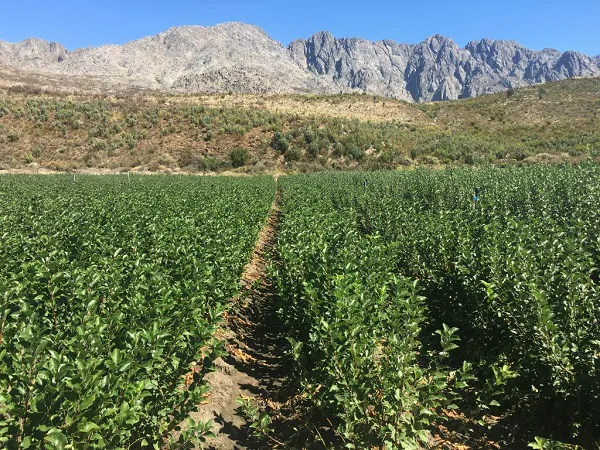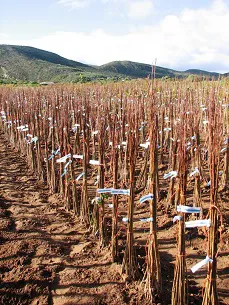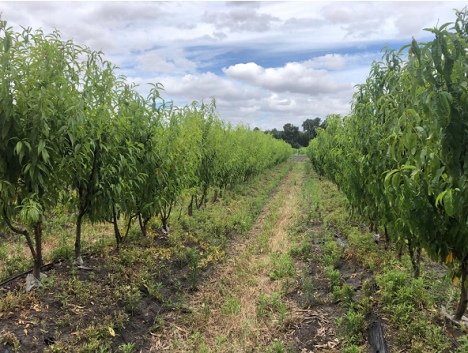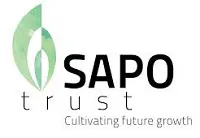The SAPO Trust organisation was set up in 1974 with the aim of enhancing plant improvement within the deciduous fruit industry (the pome and stone fruit), the table grape industry, the raisin industry, and the canning industry.
Shawn Coetzee, CEO of SAPO Trust, says: “South African farmers are very resilient and in spite of challenges brought about by the COVID pandemic, the effects of the drought in earlier years and now geopolitics, farmers continue to aspire towards constant growth. We will have more plantings in the foreseeable future in most commodities with which we deal, but right now we are in a downward trend of the cycle.”
 An apple stool bed on a Geneva rootstock established by SAPO Trust
An apple stool bed on a Geneva rootstock established by SAPO Trust
Plant improvement and ensuring plant material of high phytosanitary status remains the main aim of SAPO Trust, but its scope has grown over time to include the supply of propagation material to nurseries as well as a full suite of variety development- and intellectual property (VDIP) management services to a wide range of clients, both locally and abroad.
“It’s very much a one-stop-shop basket of services that SAPO Trust offers,” says Shawn, “from imports of plant material to enabling the propagation of trees and vines right through to the monitoring of plantings and the collection of royalties on behalf of intellectual property owners.”
SAPO Trust represents some 50 intellectual property (IP) clients (plant breeders, IP licensors and IP owners) from across the globe and maintains close relationships with international plant improvement organisations against whom they benchmark themselves.
Their headquarters are in Stellenbosch, where their nucleus facilities (where original source plants are maintained) as well as their ISO 17025 accredited plant pathology laboratory are centered. “SAPO Trust is continuously on the search for new technologies and practices that enhance plant improvement practices to bolster plant health to the greater benefit of the deciduous fruit and grapevine sector,” Shawn notes.
It is in this regard that SAPO Trust is in the process of upgrading its virus elimination facilities, is currently prioritizing the acquisition of upgraded PCR test equipment, and has just capacitated its laboratory with additional technical expertise. These capacities would enable SAPO Trust to not only advance the efficacy of its current services to its clients but also to offer pathological services to a wider spectrum of clients.
“SAPO Trust aims to serve the needs of the greater fruit industry and therefore, when it comes to plant improvement services, we are destined to expand our offering to all role players who have the best interest of the industries at heart," he says.
Certain apple varieties and cherry plantings have reached peak “Generally we’re seeing a downward trend in the sale of stone fruit plant material,” Waheed Mahomed, business unit manager of the VDIP division observes. “It has been declining over the last three years (although there was a slight spike in 2021) and we’re expecting it to continue to level off or decrease in the short term.”
“Generally we’re seeing a downward trend in the sale of stone fruit plant material,” Waheed Mahomed, business unit manager of the VDIP division observes. “It has been declining over the last three years (although there was a slight spike in 2021) and we’re expecting it to continue to level off or decrease in the short term.”
The current downward trend in plant material sales, meaning the potential expansion and renewal of orchards is currently being constrained as a result of a confluence of factors, not just the desire by the market for certain varieties.
The recent pandemic, followed by the war, has heavily impacted the flow of money into the industry which relies so heavily on exports, plus the recent drought which severely affected the stone fruit industry. The canning industry has been in decline for a number of years.
However, the appetite for new plantings in the raisin industry is high, while there is a gradual growth trajectory anticipated in the table grape industry.
“Farmers become more selective based on the performance of varieties over time,” Shawn notes. “Table grape varieties are coming in at a speed and some are performing, some are not.”
Cherries have stabilized, and certain apple varieties have reached their peak, he believes, but there is room for growth because of the high numbers of new varieties that show promise, many licensed with SAPO Trust, and for which overseas market development is being done by IP owners.
“My feeling is that we’ll be moving more into a bi-coloured apple space, away from full colour apples. That said, Fuji types are highest in demand in terms of China and Japan.”
The long-term outlook of the pome-and stone fruit industry is for a doubling of pome fruit and stone fruit production by 2050.
Budwood supplied to 60 nurseries
SAPO Trust aims to remove as many limitations for growers as possible, remarks Waheed and an example of this is the revitalization of their virus elimination service, available to the entire industry.
 A SAPO Trust stonefruit budwood park
A SAPO Trust stonefruit budwood park
SAPO Trust supplies around 60 nurseries with trees and vines, with budwood and vine harvesting teams are constantly on the road, covering large amount of kms across the country. Budwood harvesting of rootstocks and scions takes place in Grabouw, Montagu, Ceres, all the way to Upington in the Northern Cape.
“Budwood parks play an essential role in providing high-quality plant material to nurserymen and it ensures better control,” Shawn explains. “It’s a ringfenced facility to ensure optimal production of specifically that, only budwood. Eighty percent of SAPO Trust’s material comes from budwood parks.”
Their dedicated budwood team delivers budwood to the doorstep of the nursery, a one-stop service, sometimes within the same day.
SAPO Trust produces around 80% of the stone fruit industry’s budwood and 20% of the budwood for the pome industry, in cooperation with its contracted stone fruit nurseries.
SAPO Trust is currently undertaking a strategic review in which the organization is determining how best their nursery in Riviersonderend can support the plant improvement objectives of the SAPO Trust and the industries its serves. They have exited the commercial nursery business in 2021 in an endeavour to reposition its Riviersonderend facility towards the objectives of ensuring a consistent pipeline of premium quality clean plant material to the industry.
Shawn further notes that whereas the Riviersonderend facility is also known for producing high-quality rootstocks to the pome and stone fruit industries, the production of rootstocks is further enhanced by SAPO’s affiliated industry tissue culture (TC) facility in the Paarl region, a facility which aims at producing virus-free rootstocks through rapid micro propagation under sterile conditions.
“We are excited to see the industry’s TC plants offered to the broader industry at more affordable rates in the long run, what makes this even more promising is that the first set of plants offered on a moderate scale post the trial-and-error phase, would already be delivered to TC clients in this current year,” Shawn adds.
Variety development and intellectual property (VDIP)
SAPO Trust is the master licensee of various types of rootstocks and scion varieties, with new varieties coming in continuously. Another focus is on improved genetics of varieties already commercially grown, by selecting the best genetic material for improved selections over time.
“VDIP facilitates the initial life of variety, taking it through quarantine, monitoring it along this path,” Waheed says. “Nucleus plants (the source for the rest of the material) can always be traced to where they are held at the nucleus site.”
SAPO Trust reports to the IP owner on the varieties the latter has brought into the country, giving them frequent updates and third-party evaluations, according to different models.
“We follow a non-exclusive model as far as possible,” Shawn says, striking a balance between what they project downstream demand from producers to be and the desires of the IP owner. For more information:
For more information:
Shawn Coetzee
SAPO Trust
Tel: +27 21 887 6823
Email: info@saplant.co.za
https://www.saplant.co.za/
